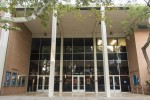Students around the world may be able to stream recordings of “Dracula,” “Pride and Prejudice” and Shakespearean plays.
In October, the L.A. Theatre Works entered Audio Theatre 2.0 into the My LA2050 Grants Challenge, which will award up to $100,000 to community projects that receive the most online votes from the public. If they are announced as a winner on Dec. 6, LATW would revamp an online program that allows wide web access to more than 500 of its recorded shows. It would share recordings, podcasts and interactive experiences of shows at UCLA’s James Bridges Theater, some of which feature UCLA professors.
“They can listen to (the plays) whenever they want, wherever they want, however they want,” said Brian Kite, chair of the department of theater at UCLA and a director of LATW productions such as “Pride and Prejudice.”
Moreover, Audio Theatre 2.0 would use the funds to allow the recordings to be used in schools, integrating the shows with history, English and science lessons, said Vicki Pearlson, LATW secretary and managing director. The 20 to 30 interactive applications would be accessible on its new website for free for registered educators.
Daniel Ionazzi, director of production for the department of theater at UCLA who has designed LATW shows, said he believes the creative power of LATW productions would bring a variety of classic and modern characters to Audio Theatre 2.0’s audience.
[Related: L.A. Theatre Works explores modern love in its new radio theater production “Completeness’]
LATW blocks its shows so performers are close to a microphone in front of them and are facing towards the audience as much as possible, Pearlson said.
“When we direct these, we focus the performance into the microphone,” Kite said. “It’s almost like a one on one experience with the audience members.”
Listening to audio recordings of the shows is a different way to experience them, emphasizing the script, Kite said. From historical shows such as “Judgment at Nuremberg” and “Top Secret: The Battle for the Pentagon Papers” to shows about identity and introspection such as “The Graduate,” Kite and Ionazzi believe the performances will teach listeners lessons about themes ranging from the nature of evil to the process of growing up.
Audio Theatre 2.0 could also motivate high school students to be interested in the theater, Ionazzi said.
Jessica Kubzansky, a visiting assistant theater professor at UCLA who directed LATW’s “Tooth and Claw,” also stressed the importance of bringing the arts to schools.
“Humans have a primal need for storytelling,” Kubzansky said. “Unfortunately, there’s less and less support for the arts in the schools, and I think that’s a tragedy.”
[Related: UCLA Grand Challenges program awarded $100,000 grant]
Recorded in front of a live audience at the James Bridges Theater, “Tooth and Claw” will be included in a special relativity series that will focus on getting the public interested in science and technology, Pearlson said.
“Judgment at Nuremberg,” a show directed by Kite, can help audiences understand the sense of confusion and anger caused by the events of the Holocaust in a way history textbooks can’t, Ionazzi said. Audio Theatre 2.0 would provide a means to restore the cultural relevance of “Judgment at Nuremberg,” Kite said.
“Now you are not just learning the facts of history, but rather you are getting inside the minds of the people who are living that history,” Kite said. “I wanted the audience to feel that they were right there.”
Recorded theater that can bring the past to life can be seen in another of Kite’s shows. “Top Secret: Battle for the Pentagon Papers” explores whether the government should have a say in what information is released to the public, Kite said.
Recording shows and putting them online may take away the visual impact of the shows, but having them readily accessible will spread the messages of his shows effectively, Kite said.
“It’s important to capture these plays, to have these moments,” Kite said. “It is the best use of this technology.”
